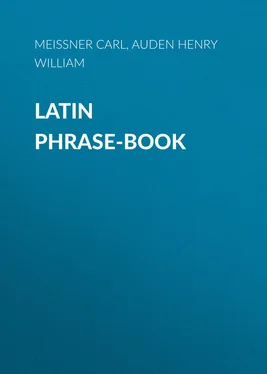Carl Meissner - Latin Phrase-Book
Здесь есть возможность читать онлайн «Carl Meissner - Latin Phrase-Book» — ознакомительный отрывок электронной книги совершенно бесплатно, а после прочтения отрывка купить полную версию. В некоторых случаях можно слушать аудио, скачать через торрент в формате fb2 и присутствует краткое содержание. Жанр: foreign_antique, foreign_prose, на латинском языке. Описание произведения, (предисловие) а так же отзывы посетителей доступны на портале библиотеки ЛибКат.
- Название:Latin Phrase-Book
- Автор:
- Жанр:
- Год:неизвестен
- ISBN:нет данных
- Рейтинг книги:5 / 5. Голосов: 1
-
Избранное:Добавить в избранное
- Отзывы:
-
Ваша оценка:
- 100
- 1
- 2
- 3
- 4
- 5
Latin Phrase-Book: краткое содержание, описание и аннотация
Предлагаем к чтению аннотацию, описание, краткое содержание или предисловие (зависит от того, что написал сам автор книги «Latin Phrase-Book»). Если вы не нашли необходимую информацию о книге — напишите в комментариях, мы постараемся отыскать её.
Latin Phrase-Book — читать онлайн ознакомительный отрывок
Ниже представлен текст книги, разбитый по страницам. Система сохранения места последней прочитанной страницы, позволяет с удобством читать онлайн бесплатно книгу «Latin Phrase-Book», без необходимости каждый раз заново искать на чём Вы остановились. Поставьте закладку, и сможете в любой момент перейти на страницу, на которой закончили чтение.
Интервал:
Закладка:
noctes diesque, noctes et dies, et dies et noctes, dies noctesque, diem noctemque – night and day.
tempus matutīnum, meridianum, vespertinum, nocturnum – morning, noon, evening, night.
tempora matutina – the morning hours.
in dies (singulos) – from day to day.
in diem vivere – to live from day to day.
alternis diebus – every other day.
quattuor dies continui – four successive days.
unus et alter dies – one or two days.
dies unus, alter, plures intercesserant – one, two, several days had passed, intervened.
diem proferre (Att. 13. 14) – to adjourn, delay.
biduo serius 34 34 Used absolutely "too late" = sero ; if "too late for," "later than," always serius (quam) .
– two days late.
horā citius – an hour too soon.
postridie qui fuit dies Non. Sept. (Nonarum Septembrium) (Att. 4. 1. 5) – on the day after, which was September 5th.
hodie qui est dies Non. Sept.; cras qui dies futurus est Non. Sept. – to-day the 5th of September; tomorrow September the 5th.
dies hesternus, hodiernus, crastinus – yesterday, to-day, tomorrow.
diem dicere colloquio – to appoint a date for an interview.
ad diem constitutam – at the appointed time.
diem videre, cum… – to live to see the day when…
dies dolorem mitigabit – time will assuage his grief.
quota hora est? – what time is it?
tertia hora est – it is the third hour (= 9 A.M.)
ad horam compositam – at the time agreed on.
III. Parts of the Human Body
omnibus artubus contremiscere – to tremble in every limb.
aures claudere, patefacere (e.g. veritati, assentatoribus ) – to turn a deaf ear to, to open one's ears to…
aures praebere alicui – to listen to a person.
aures alicuius obtundere or simply obtundere (aliquem) – to din a thing into a person's ears.
in aurem alicui dicere (insusurrare) aliquid – to whisper something in a person's ears.
ad aures alicuius (not alicui ) pervenire, accidere – to come to some one's ears.
aures erigere – to prick up one's ears.
oratio in aures influit – his words find an easy hearing, are listened to with pleasure.
aures elegantes, teretes, tritae (De Or. 9. 27) – a fine, practised ear.
neque auribus neque oculis satis consto – I am losing my eyesight and getting deaf.
caput aperire (opp. operire ) – to uncover one's head.
capite aperto (opp. operto ) – bare-headed.
capite obvoluto – with head covered.
caput demittere – to bow one's head.
caput praecīdere – to cut off a man's head.
caput 35 35 caput has several metaphorical meanings, e.g. capita coniurationis (Liv. 9. 26), the leaders of the conspiracy; caput Graeciae , the capital of Greece; caput cenae , the chief dish; capita legis , the headings, clauses of a law; id quod caput est , the main point; de capite deducere (Liv. 6. 15), to subtract from the capital; capitis periculum , mortal peril; capitis deminutio ( maxima, media, minima ) (Liv. 22. 60), deprivation of civil rights. caput is often combined with fons = source, origin, e.g. ille fons et caput Socrates (Cic. De. Or. 1. 42); in aegritudine est fons miseriarum et caput (Cic.) By metonymy caput is used with liberum (and noxium ) (Verr. 2. 32. 79) with the meaning of a free (guilty) person, individual.
parieti impingere – to strike one's head against the wall.
cervices (in Cic. only in plur.) frangere alicui or alicuius – to break a person's neck.
gladius cervicibus impendet – a sword hangs over his neck.
hostis 36 36 Cf. velut in cervicibus habere hostem (Liv. 44. 39); bellum ingens in cervicibus est (Liv. 22. 33. 6).
in cervicibus alicuius est – the foe is at our heels, is upon us.
promittere crinem, barbam – to grow one's hair, beard long.
passis crinibus – with dishevelled hair.
capilli horrent – his hair stands on end.
capilli compti, compositi (opp. horridi ) – well-ordered, well-brushed hair.
extremis digitis aliquid attingere – to touch with the fingertips.
frontem contrahere (opp. explicare ) – to frown.
frontem ferire, percutere – to beat one's brow.
in fronte alicuius inscriptum est – one can see it in his face.
ab alicuius latere non discedere – to be always at a person's side.
a latere regis esse – to belong to the king's bodyguard.
manum (dextram) alicui porrigere – to give one's hand to some one.
manum non vertere alicuius rei causa 37 37 Cf. ne digitum quidem porrigere alicuius rei causa .
– to make not the slightest effort; not to stir a finger.
manus inicere, inferre, afferre alicui – to lay violent hands on a person.
manus tollere – to raise one's hands in astonishment.
manus dare – to own oneself conquered, surrender.
manu ducere aliquem – to lead some one by the hand.
manu or in manu tenere aliquid – to hold something in one's hand.
in manibus habere aliquid (also metaphorically) – to have something in one's hands, on hand.
de manu in manus or per manus tradere aliquid – to pass a thing from hand to hand.
ex or de manibus alicui or alicuius extorquere aliquid – to wrest from a person's hand.
e manibus dimittere – to let go from one's hands.
in alicuius manus venire, pervenire – to come into some one's hands.
in alicuius manus incidere – to fall unexpectedly into some one's hands.
in manus(m) sumere aliquid – to take something into one's hands.
in manibus 38 38 Notice too liberos de parentum complexu avellere (Verr. 2. 1. 3. 7), to snatch children from their parents' "arms" (not brachium ), so in alicuius complexu mori ; in alicuius complexu haerere . medium aliquem amplecti , to take to one's arms, embrace; libentissimo animo accipere , to welcome with open arms.
aliquem gestare – to carry in one's arms.
e (de) manibus effugere , 39 39 Distinguish effugere aliquid , to escape the touch of, e.g. invidiam, mortem ; and effugere ex aliqua re , to escape from a position one is already in, e.g. e carcere, e caede, e praelio . Notice fugit me , it escapes my notice.
elābi – to slip, escape from the hands.
inter manus auferre aliquem – to carry some one away in one's arms.
compressis manibus sedere (proverb.) (Liv. 7. 13) – to sit with folded arms; to be inactive.
mordicus tenere aliquid – to hold fast in the teeth (also metaphorically, obstinately).
oculos conicere in aliquem – to turn one's gaze on; to regard.
oculos circumferre – to look in every direction.
in omnes partes aciem (oculorum) intendere – to gaze intently all around.
omnium oculos (et ora) ad se convertere – to draw every one's eyes upon one.
omnium animos or mentes in se convertere – to attract universal attention.
conspici, conspicuum esse aliqua re – to make oneself conspicuous.
Читать дальшеИнтервал:
Закладка:
Похожие книги на «Latin Phrase-Book»
Представляем Вашему вниманию похожие книги на «Latin Phrase-Book» списком для выбора. Мы отобрали схожую по названию и смыслу литературу в надежде предоставить читателям больше вариантов отыскать новые, интересные, ещё непрочитанные произведения.
Обсуждение, отзывы о книге «Latin Phrase-Book» и просто собственные мнения читателей. Оставьте ваши комментарии, напишите, что Вы думаете о произведении, его смысле или главных героях. Укажите что конкретно понравилось, а что нет, и почему Вы так считаете.

![Рис Хьюз - Madonna Park[e-book - рассказы]](/books/94285/ris-hyuz-madonna-park-e-book-rasskazy-thumb.webp)










